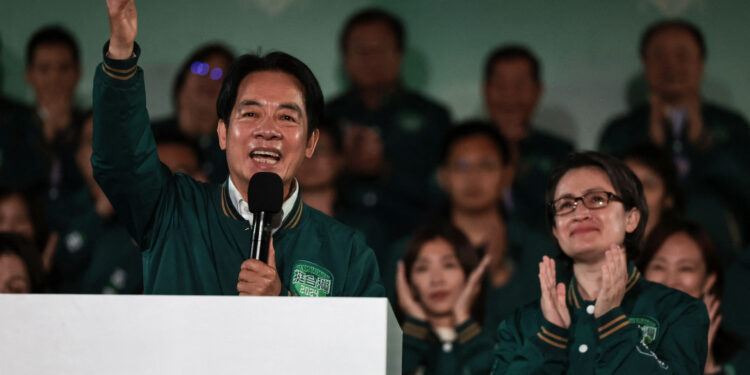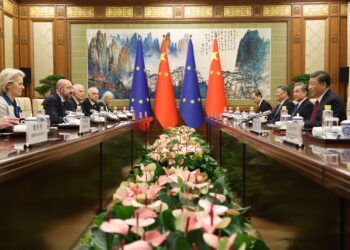Brussels – 2024’s most disruptive election for the potential global consequences between China, the US, and Europe delivered the expected result. Autonomist candidate Lai Ching-te, the island’s current vice president and a leading exponent of the Democratic Progressive Party (DPP), won Taiwan’s presidential election. From now on, Brussels and Washington will have to carefully watch all nuances of the Chinese response, which sees the future president as a threat and an obstacle to Beijing’s plan to annex Taiwan to the People’s Republic of China. “The European Union stresses that peace and stability across the Taiwan Strait are crucial for regional and global security and prosperity,” according to a statement from the European External Action Service (EEAS) published after the announcement of the outcome of Saturday’s (January 13) vote.

The single-round presidential election handed Lai the victory with 40 percent of the vote, edging out by more than 6 percentage points the candidate of the conservative Kuomintang (KMT) party, Hou Yu-ih – who is in favor of a gradual rapprochement with China – while the former mayor of the capital Taipei, Ko Wen-je, came in third with 26.5 percent. The reaction from Brussels showed particular caution, partly because of the tough stance with which Chinese diplomacy positioned itself against governments that congratulated the election’s winner. On a more general level, the EU congratulated “all voters who participated in this democratic exercise,” highlighting that “our respective systems of government are based on a shared commitment to democracy, the rule of law, and human rights.” From January 20 – when Taiwan’s new president takes office – Lai will face two major problems: first, the absence of a majority for his DPP in parliament (which must approve the laws and expenditures he has submitted), but more importantly, the military threat from Beijing.
The latter is a concern explicitly shared by EU institutions, which speak of “growing tensions in the Taiwan Strait” and opposition to “any unilateral attempt to change the status quo” between Taipei and Beijing. The risks of a possible invasion of the island by the Chinese military also closely involve the EU, developments in international trade, and ambitions to move forward with the twin digital and green transition. Although Taiwan is a country of only 23 million people, over the years, it has carved out a leading role for itself in advanced semiconductor production – with more than 90 percent of global output – and the EU still experiences heavy dependence on the country’s large suppliers. Should global semiconductor supply chains be disrupted, the new European Chips Act (in force since September 2023) would still not be able to make up for the losses in clean technology production: the Union’s goal is to double its global market share by 2030, from 10 percent to at least 20 percent.
The EU between China and Taiwan
“We need to preserve the status quo in Taiwan, which cannot be changed by force. It is crucial to maintain peace and trade globally and in the region,” EU EU Commission Vice-President for Economic Affairs, Valdis Dombrovskis, recently said in a debate at the EU Parliament plenary session on Chinese threats in the Taiwan Strait. A few days earlier, the president of the European Commission, Ursula von der Leyen, and of the European Council, Charles Michel, had attended the 24th EU-China summit in Beijing where the guidelines for the reorientation of the EU-China relationship – given the trade imbalance with the partner/competitor – and the issues of tensions in Ukraine and Taiwan with the Chinese leader, Xi Jinping, were reiterated, as French President Emmanuel Macron had done in early April.
The issue of the EU’s relationship with Taipei – in the case of escalating tensions with Beijing – had been at the center of a tense internal debate within the Union in the spring of last year, due to the words of French President Macron returning from the Beijing trip: “The worst thing would be to think that we Europeans must become followers on this issue and take our cue from the U.S. agenda and a Chinese overreaction,” Macron said at the time, outlining the need for true European strategic autonomy (but not an equidistance between Washington and Beijing). The president of the Commission and the EU High Representative for Foreign Affairs and Security Policy, Josep Borrell, threw water on the fire, advocating the need for unity against China’s “policy of division and conquest” and “firm opposition” to any unilateral change of the status quo, “particularly through the use of force.” Borrell confirmed this position in an interview with Le Journal du Dimanche, urging European navies to “patrol the Taiwan Strait, to demonstrate Europe‘s commitment to freedom of navigation in this absolutely crucial area” for global trade.
English version by the Translation Service of Withub






